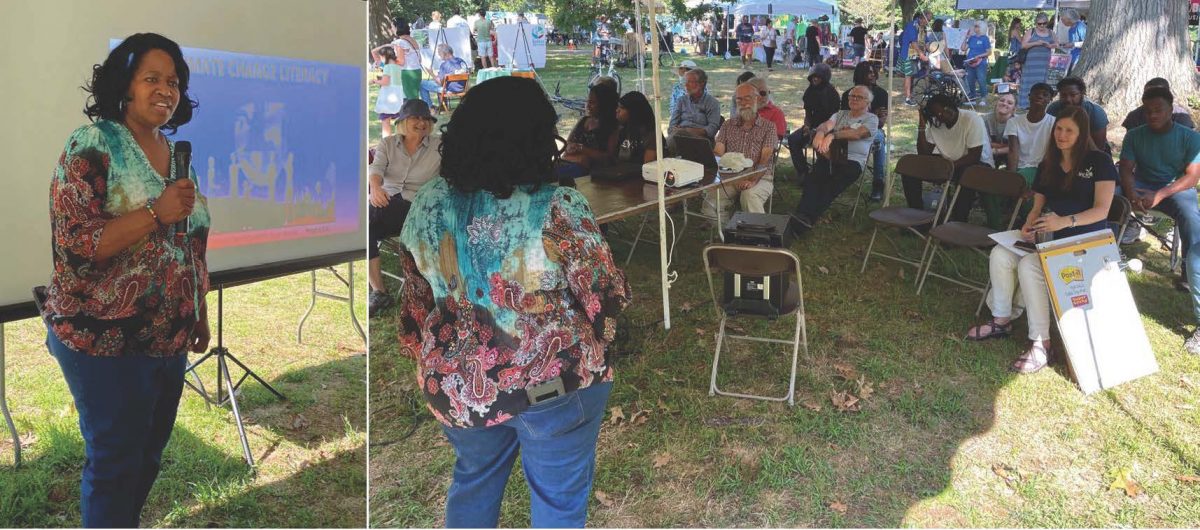
Four Connecticut cities have joined a pilot project to boost community participation in climate change planning.
Community activities in Bridgeport, New Haven, New London and Norwich are being led by Connecticut Sea Grant with support from the National Oceanic and Atmospheric Administration (NOAA) and will focus on climate risk communication and planning for community resilience. The pilot project received a $75,000 NOAA investment in Fiscal Year 2022, which will be administered by Connecticut Sea Grant.
“Equity is central to how we conduct business at the Department of Commerce — and how we plan for the future,” said Deputy Secretary of Commerce Don Graves. “By developing and refining techniques for engaging vulnerable populations, this project will help ensure that communities in Connecticut are in charge of their climate future.”
In New Haven, Connecticut Sea Grant has hosted two information booths and workshops at community events—which all led up to a “Climathon” on Oct. 29 that engaged residents in understanding and reducing climate vulnerabilities in their neighborhoods. Steve Hamm, one of the founders of Reimagining New Haven, a grassroots group working on the Climathon, describes the Fair Haven neighborhood where the Climathon will be held as “ground zero” for climate change in New Haven.
“We hope to make New Haven more resilient, equitable and just by engaging with a diverse set of people from our communities to catalyze action—drawing on scientific expertise, local voices and the arts,” Hamm said.
Read about the Climathon here.
A similar series of community climate events is being planned for Bridgeport in the spring.
Connecticut Sea Grant is also partnering with leaders from local NAACP chapters, Indigenous and tribal communities, racial justice and arts organizations on events being planned in Norwich and New London. Participants will consider climate change impacts in the context of other community challenges such as housing, education, mental health, racial justice and food security, and develop actions to address them.
Key components of activities in all four communities include practical incentives for participation, such as offering transportation and gift cards, scheduling events at optimal times for working families and using locally owned businesses to provide food and refreshments.
“Connecticut Sea Grant is well-positioned to support this pilot project because we work alongside communities every day to connect NOAA’s climate products and services to those who need them,” said Sylvain De Guise, Connecticut Sea Grant director. “But, we’ve got to get better at working with the communities who need these services the most. Populations that are most impacted by climate-related hazards like flooding and storm surge need to be at the table if we are going to be successful.”
The pilot project aligns with efforts at the state level to develop policy recommendations through an equity lens. Connecticut’s Equity & Environmental Justice Working Group, part of the Governor’s Council on Climate Change, was instrumental in organizing officials and environmental justice experts for a 2021 NOAA roundtable where participants shared their lived experience with climate planning and the barriers and challenges associated with getting a seat at the policy table. Activities to involve vulnerable communities in climate and resilience planning were a primary recommendation of the listening session that informed the pilot project.
“I am so pleased to see this pilot provide the resources needed to break down those barriers and try some of the approaches highlighted in the Council process,” said Rebecca French, director of the Office of Climate Planning in the Office of the Commissioner at the Connecticut Department of Energy and Environmental Protection. “I look forward to learning how the state can continue to improve our work in this space.”
“Climate hazards such as flooding and storm surge threaten communities across Connecticut,” said NOAA Administrator Rick Spinrad, Ph.D. “This pilot project will help give vulnerable communities the tools they need to meaningfully inform climate planning, and allow people to take an active role in becoming climate-ready and resilient.”
This pilot project builds on NOAA’s commitment to sustained engagement with underserved communities, and is part of an investment in seven pilot projects happening across the country. Each regional pilot is responding directly to feedback received from partners during climate and equity roundtable discussions that NOAA conducted in 2021. Pilots are taking a unique, place-based approach to helping vulnerable communities better understand, prepare for and respond to climate change.
Learn more about upcoming pilot project announcements and NOAA’s ongoing environmental justice efforts.
UPCOMING EVENT:
Climathon
October 29, 1-6 p.m.
Martinez School
100 James Street
Fair Haven, CT
Contact: https://reimaginingnewhaven.org/contact-us
Register for this free event: https://www.eventbrite.com/e/new-haven-climathon-tickets-434198518457
Climathon information: https://reimaginingnewhaven.org/our-projects/f/our-design-charrette